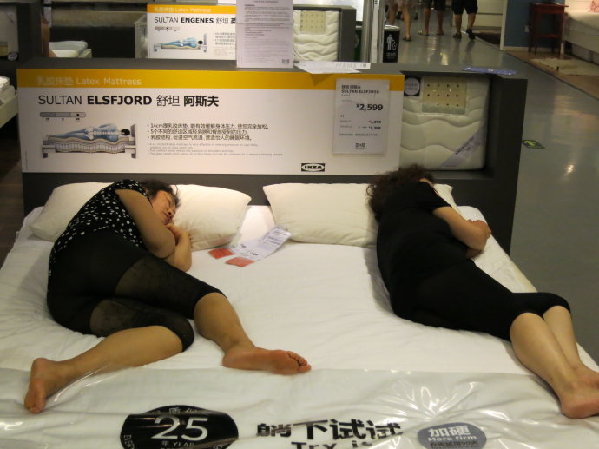Ikea lounger story a show of Swedish brand's tolerance
- By Ni Tao
 0 Comment(s)
0 Comment(s) Print
Print E-mail Shanghai Daily, September 19, 2016
E-mail Shanghai Daily, September 19, 2016
|
|
|
The sight of people who "pass out" on Ikea couches or beds is so common that one loses count of how many times similar reports have appeared in overseas media. |
Ikea stores in China have again made headlines, for the same reason they often do. The New York Times published a story on August 26 entitled "Shh, it's naptime at Ikea in China." The story claimed that "When browsing coffee tables, kitchen cabinets and dessert plates becomes too exhausting at an Ikea store in China, feel free to pass out under a deliciously cozy Fl?ng duvet or across a Stor? loft bed — right in the showroom."
In fact, the sight of people who "pass out" on Ikea couches or beds is so common that one loses count of how many times similar reports have appeared in overseas media. For what I can remember, starting in 2010, Western media have cast their spotlight on this so-called "clan of Ikea sleepers." There are also expats who blog about coming across customers who are so sound asleep that they even snore or drool.
Many of the media or blog articles carry headlines that are, let's say, unflattering at the very least, such as "Chinese Ikea customers make themselves a little too comfortable at home," or "Sleeping, dating, vomiting... is there anything Ikea won't let you do?" Many foreigners are frankly appalled at the seemingly outlandish sight of people lying sprawled on beds, sometimes even with Ikea bedding wrapped around them.
In their eyes, that people have no qualms about turning a public showroom into their private bedroom says a lot about their selfish egos, poor manners and incredible disregard of privacy, something most Westerners have come to take for granted. Attempts are made to explain the socioeconomic and cultural reasons behind the fact that Chinese appear to have the uncanny ability to sleep in any environment.
One possible explanation is that the siesta is a time-honored tradition in China. Besides, children and the elderly easily tire of shopping or just hanging out in an immense Ikea store. As a frequenter of Ikea, I sometimes picture myself slumping into the fluffy pillows and enjoying some shut-eye on the soft mattresses. But unlike those who act on such impulses, I keep them to myself.
Many seem to be wondering what this fuss is all about, since Ikea itself is fairly tolerant of the sleepers, despite occasional complaints from its staff who have to change or smooth creased bed sheets. When asked to comment on this phenomenon, Josefin Torell, a spokeswoman at Ikea's head office in Sweden, once said to the effect that the company neither bans nor encourages this behavior, and this is actually not an issue at all as it delights them to see customers feel so at home at Ikea, which is aptly transliterated as "Yi Jia" in Chinese, meaning a "cozy home."
Indeed, those customers dozing off on Ikea beds are an unpleasant sight, and not all Chinese are willing to sacrifice privacy and "face" for comfort. Criticisms such as these are not entirely unjustified. But they perhaps miss the point about Ikea as being more than a mere seller of household amenities. Rather, it has always been a vibrant social space since its first store in China opened in 1998.
For many, Ikea is a free, multi-functional social space they can hardly find elsewhere in today's China. Senior citizens date there, and even bring their own food, to which Ikea turns a blind eye. In summer, the air-conditioned mall provides a refuge for lower-income households living in cramped, stuffy urban homes. Holiday-makers traveling in big cities on tight budget make a point of spending a day at Ikea, shopping, browsing and relaxing, followed by a meal of Ikea's iconic Swedish meatballs and baked salmon.
In an increasingly expensive society, there remains very few places where fun can be had for almost as cheap as what one pays for the national pastime of square dancing. No wonder the BBC once described Ikea as a "theme park" in China. In fact, in addition to the clan of sleepers, Ikea also takes a tolerant attitude toward people who steal its business. I once saw a WeChat posting whose author told of his experience with a couple who delivered a piece of Ikea furniture to his home and helped assemble it. The couple is among the small-time porters who loiter outside of Ikeas, looking for customers. They charge less for delivery than the store, which, aware of their existence, mercifully leaves them alone.
One thing that we find most lacking in China today is the spirit of tolerance. Not all are happy to show civility to people they regard as socially inferior, such as scavengers and migrants. A ritual among local newspapers has been the coverage, year after year in summer, of the legion of pensioners chilling out in air-conditioned subway stations or bookstores, as if their presence causes some kind of intangible harm.
Although these news items contain no air of irreverence, they often carry undertones that seem to suggest that these air-conditioning "refugees" are an eyesore. Can we not be a little more tolerant?






